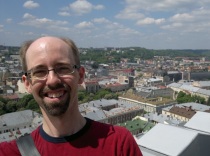On Fridays in my Russian class I’m learning words about God, слова о Боге. Yesterday, we reviewed last weeks theme, which was words about the Bible. My teacher asked me to say sentences following the patter, “The Bible is _____.” I’d already covered things such as, God’s word, absolute truth, a historical book, the history of redemption, and the book inspired by God’s Spirit, but when I tried to say the Bible is the living Word, her response was, “We don’t say that.” I told her I thought there is a phrase like that in the Bible, at least in English, and we made part of my homework finding the phrase—which I couldn’t remember then—and finding its equivalent in Russian.
So, what I was thinking of was Jesus and Peter’s conversation in John 6:66-69:
After this many of his disciples turned back and no longer walked with him. So Jesus said to the Twelve, “Do you want to go away as well?” Simon Peter answered him, “Lord, to whom shall we go? You have the words of eternal life, and we have believed, and have come to know, that you are the Holy One of God.”
When I found that passage this morning in English, I decided to try translating Peter’s response into Russian myself before looking it up. Here’s what I came up with, mistakes and all:
Симон Пётр ответал ему, “Господь, кому мы поидём? У тебя есть слов вечной жизни, и мы поверили и узнали, что Ты — Святый Бога.”
Here are those verses in Russian, Евангелие от Иоанна 6:68,69, first from the widely-used, old Synodal translation (Синодальный перевод, translated 1813 – 1876), and second from the Russian Bible Society’s 2011 translation, Библия. Современный русский перевод, 2011:
Симон Петр отвечал Ему: Господи! к кому нам идти? Ты имеешь глаголы вечной жизни: и мы уверовали и познали, что Ты Христос, Сын Бога живаго. [Synodal, 1876]
“Господь,” ответил Ему Симон Петр, “к кому мы пойдем? У Тебя слова, дающие вечную жизнь. И мы поверили и знаем, что Ты — Святой Божий.” [Modern, 2011]
I got pretty close, but made a number of mistakes. First, I forgot the “к” for the phrase, “к кому,” using the dative form of “whom” but forgetting that the verb of motion, пойдем, requires the “к кому.” Second, I misspelled the verb, we will go, пойдем. Third, though I got the Russian syntax of ‘You have” correct (horray!), in the present tense its not necessary to use, “есть.” Fourth, though I knew I needed a nominative plural ending for “words,” I confused genders and cases: слово is neuter nominative singular, so the correct plural would be слова, but somehow I was thinking the ending drops off leaving just the stem—слов, but that would be a feminine genitive plural ending—nonsense for what I was trying to translate. Fifth, I omitted the present participle of “to give”, дающие (giving), and simply rendered it as, “you have words of eternal life,” but that’s mostly because we haven’t learned any participles yet in class. Sixth, I used a past tense for “have come to know,” so said, узнали “we knew” and missed that this is a past action with continuing effect, but the Modern Russian translation uses the simple present, “to know.” And last, I tried to render “the Holy One of God” with the nominative singular for the noun, “holy” plus the genitive singular for “of God”, but I used the wrong ending on for holy, Святой. Technically, I translated Бога, “of God,” correctly, but apparently the Modern Russian makes the stylistic choice to use the adjective form of God, Божий, for which we don’t really have an equivalent in English (our word, “godly” is different because it describes people who are like God, whereas Божий only refers to God).
So, here’s my corrected translation, preserving my word order choice:
Симон Пётр ответал ему, “Господь, к кому мы пойдём? У тебя есть слова, дающие вечной жизни, и мы поверили и знаем, что Ты — Святой Божий.”
And just for the fun of it, I’m posting those same two verses in Greek. It’s been 15 years since I’ve studied any Greek, but I just looked and saw that the older Greek New Testaments, like the Textus Receptus the KJV was based on, used the phrase, “Son of the living God” like the Synodal translation, but more recent Greek New Testaments follow the consensus of New Testament scholars in using the wording, “the Holy One of God.” Here are the verses in Greek from both the NA/UBS and SBL online texts, ΚΑΤΑ ΙΩΑΝΝΗΝ 6:68-69:
ἀπεκρίθη αὐτῷ Σίμων Πέτρος· Κύριε, πρὸς τίνα ἀπελευσόμεθα; ῥήματα ζωῆς αἰωνίου ἔχεις, καὶ ἡμεῖς πεπιστεύκαμεν καὶ ἐγνώκαμεν ὅτι σὺ εἶ ὁ ἅγιος τοῦ θεοῦ.
Whatever the language, and in spite of my mistakes and misunderstanding, I’m deeply grateful that Jesus has the living words, and gives them to us by his Word and Spirit.




Stuff folks said